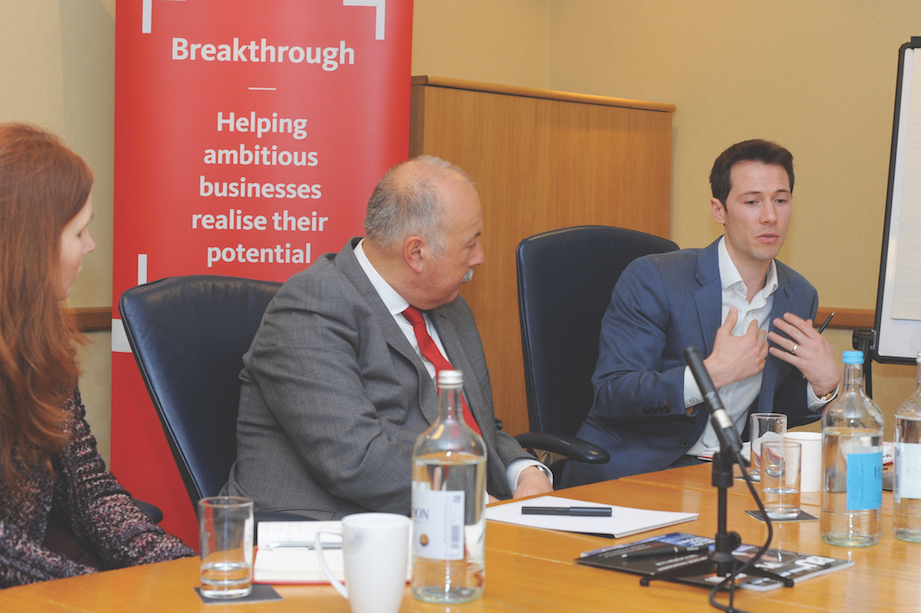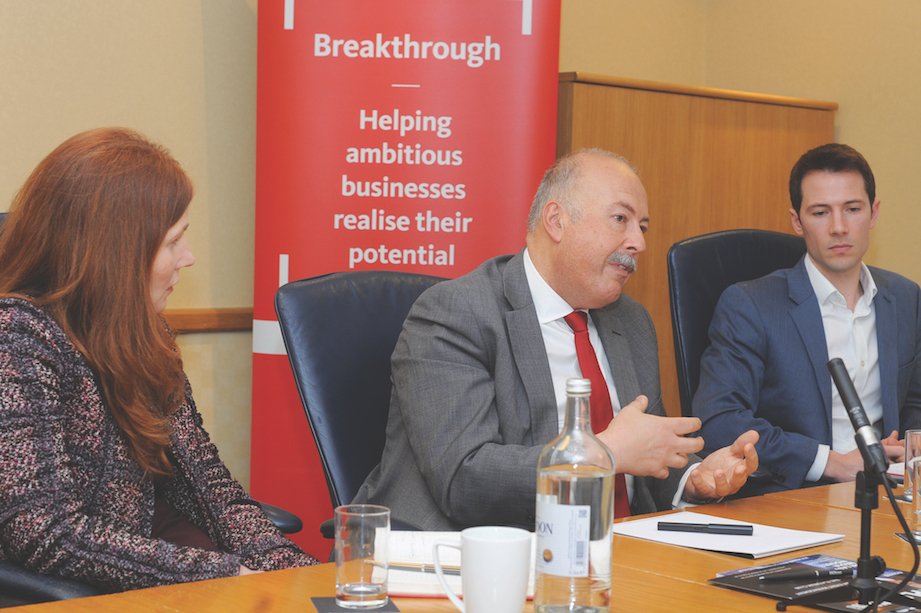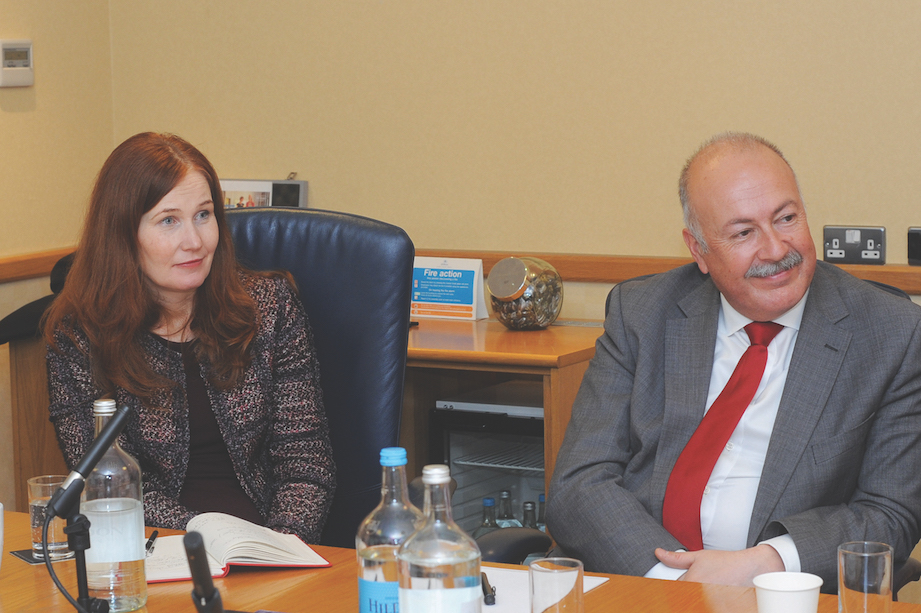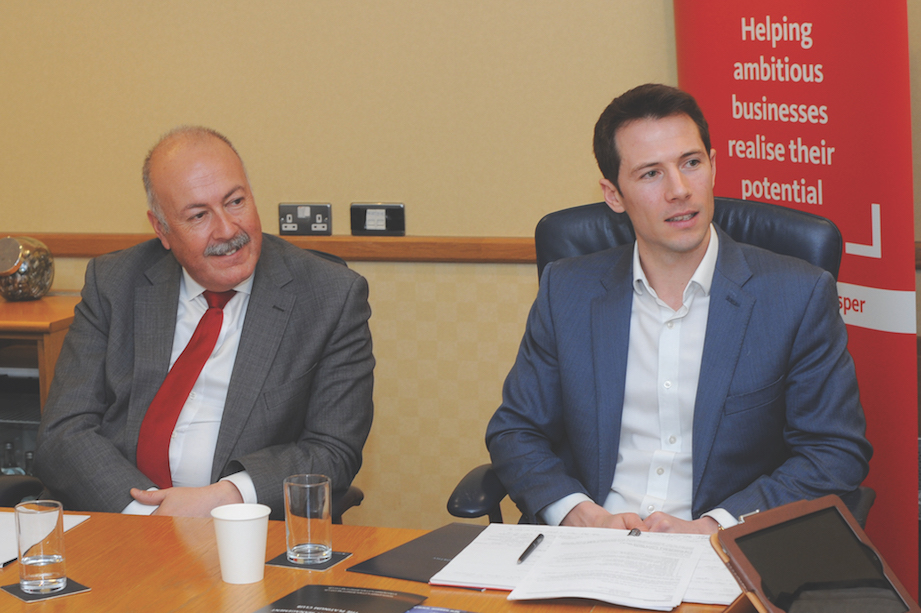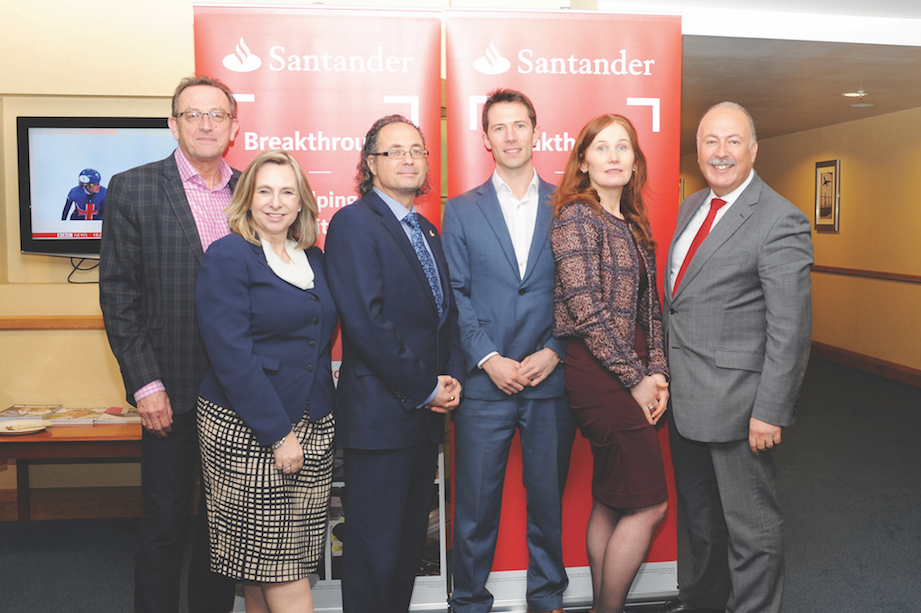
How does the acquisition of talent work in the 21st Century?
Is company culture as important as salaries?
Are companies embracing modern ways of working?
Does our education system provide work-ready candidates?
These are some of the questions tackled by our expert panel at a round table debate at the Hilton Gatwick airport.
The Debate Panel
CB – Colin Berkeley, Regional Director, Santander Business
SD – Susan Davies, Commercial Director Santander Business
LE – Laurence Emmett, Director Cranleigh Recruitment
VF – Viki Faulkner, Head of Apprenticeships, University of Brighton
KH – Keith Herrmann, Director of Employability and Careers, University of Surrey
MH – Maarten Hoffmann, Facilator and chair
THE DEBATE
How do SMEs recruit millennial talent?
LE: Our business is an SME employing 12 people, and as we recruit ourselves we see what challenges are faced elsewhere. The common issue is competitiveness as you have to be in a strong position to compete for the best talents in the market. Companies often don’t recognise how competitive it is out there. They’re looking at what they need from the person coming in for an interview rather than actually looking at what they can give that person.
The struggle isn’t finding people. We’re finding them and they’re out there to be found. Actually convincing them to join your business can be the difficult part because the good people out there will be interviewing to three or four companies in one go.
Are candidates effectively interviewing the company?
LE: I think it’s now 50/50. Big companies post videos on YouTube and people think: “Wow, I want to work for that company.” But people now come into companies almost expecting it to be like Google. Few companies can match Google but you have to work out: “What can we give to this person coming in today?” It’s not just a salary and a career path, but all the other life benefits. It’s tough because everyone’s doing the same thing.
If you’re clear about your company culture then that person can make a good decision. If you haven’t got stated principles or haven’t thought about what they are, you’re not going to get that across in a meeting.
The worst interviews you can have are just throwing questions at a candidate, ushering them on their way and then two weeks later getting back to them about the feedback.
SD: Even as a large organisation we have to compete. We have a graduate intake every year and they go through a rigorous process in order to get through the programme. But we have to pitch to them too. We do a presentation then we have a ‘speed dating’ style format, which is quite gruelling. The dynamics have shifted considerably.
LE: I do a PowerPoint presentation where I talk about the history of the business, where we are right now and how we are looking ahead. It’s all very realistic, we don’t ham it up at all. And my two co-Directors then perform the interview.
I’ve done the nice sell and I’ve projected a good side of our business and then the other guys come and say, “This is the reality of what you will be doing.” It’s very rare that people walk away from our company not feeling like they felt we put an effort into their experience. And also it’s rare that we lose people. It’s taken us five or six years of losing people to realise we had to keep stepping our game up. Keep it tight, have a good process, be organised, treat them well, keep them informed – and you’ll find the right people are going to stick with you.
CB: If you want really good, engaged candidates you’ve got to make a little bit of an effort. I am in favour of looking for students who’ve got a bit of a broader life experience such as placements or time abroad. This has had the effect of self-regulating their enthusiasm because they’ve just seen more. They’re still excited and they want to add some value but they know it’s probably not as it looks on TV.
VF: It is a competitive market out there and not all businesses have really picked up on that, particularly in those shortage sectors. We do a lot of work in construction and the built environment, in digital, IT – there are huge skills gaps here. And for smaller companies to attract and retain and get a good graduate coming out of university, you’ve got to compete for those graduates.
For example, with our ‘Built Environment’ students, we have 100% employment straight out of university - and we could fill the roles again and again and again. We have companies turning up and saying: “I could give one of your students a job.” And we have to say, in the nicest possible way: “Get in the queue!”
We can’t turn them out fast enough. It is a sector with an ageing workforce, it’s very under-skilled, it’s looking down the gun barrel of Brexit and a likely skills drain there. It knows that it needs to invest, particularly at those higher levels.
These are professional technical qualifications, so people are coming out of here with a lot of practical experience as well and are job-ready.
We want to expand these courses but we struggle to recruit staff who can teach with the right level of industry experience.
Does the skills shortage also affect the trainers?
VF: It is self-perpetuating. We work very closely with our FE college partners in subjects such as construction, engineering and manufacturing, but the colleges can’t attract enough qualified trainers to train the staff. We’re increasing the number of people that we’re training but it is four years before they come through the system. We’re always trying to look into the future and project what the workforce need is.
KH: Millennial students do have a real sense of the values of a company that they look at as they consider their options after graduating. It is slightly offset by a misunderstanding amongst students and amongst parents about student debt which is sadly encouraging more students to see their university experience as a transaction: “I’m here for three or four years, I’m going to incur £57,000 of debt. I must go out and get a job as quickly as possible.”
All of our undergraduate students have the opportunity to do a professional training year in industry as part of their degree programme. Some students choose not to do that here because they feel they want to get their studies over and done with as quickly as possible and then get out there and get a job. But they don’t realise that that year in industry is what gives them the competitive edge with employers.
VF: We also try to encourage all of our students include a year-long placement. On a lot of our courses it’s mandatory, on other courses it’s optional. Those students who have taken that year in employment in-between the second and third year of university are so much more employable and have a much more realistic view of the workplace as well.
KH: They get really frustrated about not being able to have an impact. They’ve all been geared up as a generation to have an impact in their own lives and those of others and they join organisations and become incredibly frustrated. There is a lot of churning after graduating which is a major challenge for employers.
If millennials are getting frustrated in their careers, is it not incumbent upon the universities to adjust expectations?
VF: We can suppress their expectations but do we want to? Don’t we want to turn out a generation of people who do want to make an impact, who do want to make a difference, who do want to go into a company and make a positive contribution from day one? We’re turning out a generation of students who are actually thinking, “I’m here to offer something to this company and I have value from the beginning.”
LE: We have found that in the first two years we almost have to re-train their thought process. They come into the world of work slightly under-prepared for how tough it is to survive in a cut-throat working environment. We almost break our staff down a bit before we build them back up. We do that by giving them a lot of constructive feedback but constant support. We attach ourselves to these guys and micro-manage them for the first six months and then slowly let the reins back off again.
KH: That’s a very mature approach to talent development. Many employers are looking to recruit a graduate into a functional role and then they say, “You’re in the job, off you go.” And that’s massively damaging. I can understand the need of a business to fill roles because they have functional requirements. Unless you support that, as you described, and provide a scaffolding frame that sits around a graduate, particularly in their early career development, then they won’t stay.
Are we preparing our students for a global marketplace?
KH: It is very important to prepare students to become globally competitive, so engaging with modern languages is vital. We won something called a ‘Global Graduate Award in Languages’. We won another one in sustainability and we’ll soon be creating a ‘Global Graduate in Employability’. This is all about helping our students prepare to become global graduates.
We do find the international students are far more active than the British students. International students are global by definition. They’ve got two or three languages, they’ve travelled to come and study here, they’ve got their cultural understanding, global mindset and they’ve got a way of thinking and absorbing. British students somehow aren’t. That’s a sweeping generalisation but they are at a competitive disadvantage and to some extent we need to work with employers to help them understand that.
Successive governments have not emphasised the importance of a foreign language, and by that I mean at age five, not at age 18. Many high school students across Europe are encouraged to travel as part of their experience, and even as part of the curriculum; they come to London or other parts of the UK as part of their learning journey.
VF: I would say it’s not about UK students not being up to par, it’s about UK students not having a global mindset in the way that international students do.
Are there regional differences in skill shortages?
SD: Absolutely. My region includes the manufacturing heartland of the Midlands where the skills gap is very acute. There is an ageing workforce and part of the reason is that, over the past 20-30 years, successive governments have focused on education rather than apprenticeships. Now we have many people now who are retiring and those sectors just cannot get the talent into roles.
Added to this is the talent drain in certain parts of the country, with people seeing the grass being greener in London and the South East
Having visited many engineering and manufacturing firms, you can see that younger people don’t see them as a glamorous choice in comparison to a Google-style, fancy, funky office in the centre of London.
KH: How are we selling manufacturing to young people? If you think about it, your mobile phone has tons of components in it. Young people are excited about the things like Google and coding and all these technological gadgets. We should be selling the opportunities to them: “Here’s a global challenge. Here’s a telecom sector that’s trying to develop 5G technology. Isn’t that exciting?” And yes, that involves manufacturing but it also involves coding and software development and problem solving and big data.
SD: It is about branding. We were working with a business, a foundry that manufactures the brakes that go into one of the most expensive cars in the world. Focusing on this can capture the imagination of children – a much more compelling sell than: “Come and work in a foundry in the Black Country.”
VF: We have got an image problem in manufacturing, construction, care, hospitality and in engineering. And a lot of those things need to be re-positioned and re-purposed.
MH: IBM have an Artificial Intelligence pioneer called Watson. They use that to grade their candidates. They’re putting their candidates into the computer and it’s telling them which ones they should be using, according to a ‘FIT’ score that is calculated. Another company called Predictive Hire has an SAS cloud-based analytic solution provider which saved one Australian client AUD1.1 million by using pre-hire assessment tools. Unilever uses something called Hire View. They video their management team and then the new recruiters get to assess whether they think they want to work for your management team. Is AI going to change the way we recruit and work?
LE: There are certain areas that are going to be totally disrupted. Will we pay someone to drive in 15 years’ time? I think absolutely not. The industries that will be disrupted include farming, travel agents, cashiers in shops, accounting, stock trading, fast food workers, telemarketing… But there are going to be jobs created. You could look at the fact that there are sustainability managers being hired by corporates and this role did not exist 15 or 20 years ago.
CB: The mundane parts of jobs will disappear, which leaves the interesting and the creative parts. When I was away at the weekend I travelled through Heathrow and I barely had any contact with human beings. The baggage handling, checking in, passport control is all done by machines. There are no people around anymore. The whole landscape is changing but younger people are used to this.
KH: Big companies are already using AI to get to the right person. If they’ve got x thousand people applying for 30 jobs, they’ve got to narrow those x thousand down to a shortlist. These companies have an incredibly sophisticated recruitment process.
LE: Personally, I like the human touch. I’ve worked with some large businesses that have the technology to assess candidates, but they use it alongside their interview process. They don’t screen through technology. I think that’s quite dangerous. The first message is that that company doesn’t want to talk to you in any way, they don’t want to engage with you. You’re going through a series of tests just to be able to then speak to that company. I don’t know what sort of message that sends out.
SD: It is a consequence of the sheer volume of applicants that the companies are facing and there has to be an element of automation.
VF: It is a balance. There are certain companies like Rolls Royce that will get hundreds of applications. They sponsored 20 people through a degree apprenticeship in engineering and got over 300-400 applicants. Can somebody really sit down and read in great depth and detail through every single application? It’s not until you get the applicant pool to a manageable size that you can then use personal judgement.
CB: One of the positives about using the Artificial Intelligence to do the sifting is that is avoids any unconscious bias. I went on a course where we were all given a pile of CVs to sort to highlight how unconscious bias could surface. A bit of diversity from different backgrounds, a good mix of men and women and ages can make it a more rounded business. So I think that’s a positive about the AI.
VF: The application forms that come to us have no names, no dates of birth, and no gender on them, so we shortlist without anything on the form to affect judgement. It’s quite a useful thing to have in place to ensure that no bias creeps in.
CLICK HERE for part two of the Debate



